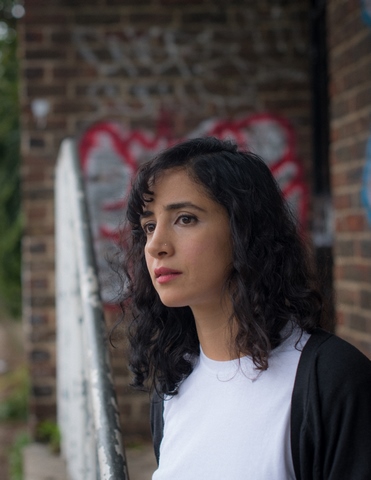about production
The murmur of the sea, seagulls scream in the background. An image most of us associate with something pleasant, romantic. Most of us here, in the West. Of us who live on ‘this’ side of the sea.
At the beginning of the short but intensive performance As Far As My Fingertips Take Me, musician and street artists Basel Zaraa, a Palestinian raised in a refugee camp in Syria, asks us to put our arm through an opening in a wall that separates us from him. We wear a pair of headphones and in the following minutes listen to a story – a rap song inspired by the story of Basel’s sisters and their refugee voyage from Syria to Sweden. Together with Basel Zaraa, this one-to-one performance was conceived by Tania El Khoury, a live artist whose work centres on interactive performances and installations with an ethical and political message and ambit. In her previous work, she has already drawn attention to the issues of migration and Arab uprising, for instance in her performance Gardens Speak, an interactive sonic documentary installation based on oral histories of activists killed in the early period of the Syrian Uprising and were buried in domestic or public gardens. In Stories of Refuge, she collaborated with asylum seekers in Munich, who used video cameras to record a day in their life in the city. The people of Munich then had the opportunity to watch this footage in the centre of town and confront the ‘other’s’ view of them but also their own view of themselves. In the most recent site-specific performance Sejjaħ lil Malta (Call Malta), she has audiences on the Maltese shore and on water taxis from Valletta to Senglea listen to stories out of seashells from Tunisia and reflect on what the Mediterranean means to them personally. To some, the sea is recreation. To others, a death trap.
Tania El Khoury ranks as one of the most prominent artistic and political activists of today. She has received several awards for her work and her performances and installations have been seen by audiences all around the globe at festivals, galleries, on the streets and in various specific sites. She represents a powerful and important artistic movement that does not want to insulate itself in the elite spaces of contemporary art galleries but rather tries to approach the person directly, in his natural habitat and speak to his mind through a story and in an extraordinary form.
Besides being a powerful testimony that impels us to consider our own responsibilities and abilities to provide real support, As Far As My Fingertips Take Me is also interesting by virtue of its form. The audience member – or perhaps more accurately, the listener – never gets to see Basel Zaraa. They will ‘only’ hear him and by way of his music listen to the voice of ‘the others’, who crave a relatively peaceful and economically and politically stable life just as we do. And it is not just their souls and hearts that will be touched, but they will be touched physically, because Basel will ink a temporary tattoo onto their forearm, which, like a memento, will for a certain time remind us of our responsibility, solidarity and perhaps spur us to real help and activity. Tania El Khoury also warns us that the ratification of the Dublin Convention in Europe left migrants to the whim of bureaucracy and discrimination whereas people are only able to reach as far as their finger- tips take them. Behind the white wall, Basel paints our fingertips. How far will these take us?
Martina Vannayová
“His tale doesn’t just touch me in a fleeting way – as the many stories and images reported in the newspapers do – it goes further. It marks me. For the next few days I will carry it around with me. It is part of me, not easily ignored or washed away. Every time I roll up my sleeves or wash my hands I am confronted by the images and rerun Zaraa’s story in my mind. I can’t get away from it.”
(Lyn Gardner, The Guardian)
“I understand listening and touching as their own kind of dissidence, as both art form and intentional practice. Horror and confusion on a mass scale are heartbreaking, then numbing; it is easier to understand sociopolitical upheaval when you are connected, heart-to-heart, to another story.”
(Monica Uszerowicz, Bombmagazine.org)
creators
directed by Tania El Khoury
music: Basel Zaraa (vocals, bass and keyboard), Emily Churchill Zaraa (vocals), Pete Churchill (music production), Katie Stevens (flute and clarinet)
performer: Basel Zaraa
director

Tania El Khoury (1976) completed her doctoral degree at Royal Holloway, University of London. Her work focuses on the ethical and political potential of the encounter between the artist and audience. She creates installations and performances in which the audience member is an active participant. Her research and publications focus on the political potential of interactive live art. Her work has been presented across five continents, in various spaces ranging from museums to cable cars. She is recipient of the Arches Brick Award 2011 (Glasgow), the Total Theatre Innovation Award (Edinburgh), and the ANTI Festival International Live Art Prize 2017 (Kuopio).
Tania El Khoury is associated with the UK-based Forest Fringe artist collective and is a co-founder of Dictaphone Group in Lebanon, a research and performance collective whose aim is to question our relationship to the city and to redefine its public space. Tania El Khoury is presenting her work at the Divadelná Nitra Festival as well as in Slovakia for the first time.
Materials available
Video of the production: no
script of the production: SK, EN
AIf you are interested in these materials, write to archivy@nitrafest.sk
